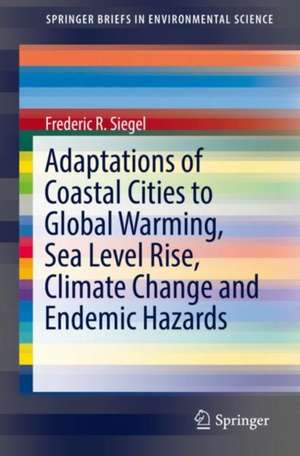Adaptations of Coastal Cities to Global Warming, Sea Level Rise, Climate Change and Endemic Hazards: SpringerBriefs in Environmental Science
Autor Frederic R. Siegelen Limba Engleză Paperback – 25 iul 2019
Din seria SpringerBriefs in Environmental Science
-
 Preț: 348.77 lei
Preț: 348.77 lei -
 Preț: 382.57 lei
Preț: 382.57 lei -
 Preț: 378.12 lei
Preț: 378.12 lei -
 Preț: 378.80 lei
Preț: 378.80 lei -
 Preț: 381.98 lei
Preț: 381.98 lei -
 Preț: 347.80 lei
Preț: 347.80 lei - 15%
 Preț: 464.18 lei
Preț: 464.18 lei -
 Preț: 378.12 lei
Preț: 378.12 lei -
 Preț: 377.53 lei
Preț: 377.53 lei -
 Preț: 379.09 lei
Preț: 379.09 lei -
 Preț: 381.00 lei
Preț: 381.00 lei -
 Preț: 383.93 lei
Preț: 383.93 lei -
 Preț: 175.58 lei
Preț: 175.58 lei -
 Preț: 475.83 lei
Preț: 475.83 lei -
 Preț: 380.07 lei
Preț: 380.07 lei -
 Preț: 378.92 lei
Preț: 378.92 lei -
 Preț: 411.93 lei
Preț: 411.93 lei -
 Preț: 375.62 lei
Preț: 375.62 lei -
 Preț: 375.45 lei
Preț: 375.45 lei -
 Preț: 378.92 lei
Preț: 378.92 lei -
 Preț: 377.57 lei
Preț: 377.57 lei -
 Preț: 377.35 lei
Preț: 377.35 lei -
 Preț: 378.34 lei
Preț: 378.34 lei -
 Preț: 344.67 lei
Preț: 344.67 lei -
 Preț: 374.30 lei
Preț: 374.30 lei -
 Preț: 362.43 lei
Preț: 362.43 lei -
 Preț: 446.26 lei
Preț: 446.26 lei - 5%
 Preț: 361.96 lei
Preț: 361.96 lei -
 Preț: 376.43 lei
Preț: 376.43 lei -
 Preț: 380.63 lei
Preț: 380.63 lei -
 Preț: 375.84 lei
Preț: 375.84 lei - 15%
 Preț: 463.20 lei
Preț: 463.20 lei -
 Preț: 383.33 lei
Preț: 383.33 lei -
 Preț: 375.23 lei
Preț: 375.23 lei -
 Preț: 377.57 lei
Preț: 377.57 lei -
 Preț: 381.59 lei
Preț: 381.59 lei -
 Preț: 379.48 lei
Preț: 379.48 lei -
 Preț: 376.04 lei
Preț: 376.04 lei -
 Preț: 413.84 lei
Preț: 413.84 lei -
 Preț: 381.81 lei
Preț: 381.81 lei -
 Preț: 352.28 lei
Preț: 352.28 lei -
 Preț: 381.81 lei
Preț: 381.81 lei -
 Preț: 381.98 lei
Preț: 381.98 lei - 5%
 Preț: 331.65 lei
Preț: 331.65 lei -
 Preț: 375.62 lei
Preț: 375.62 lei -
 Preț: 377.95 lei
Preț: 377.95 lei -
 Preț: 413.45 lei
Preț: 413.45 lei -
 Preț: 267.19 lei
Preț: 267.19 lei -
 Preț: 373.73 lei
Preț: 373.73 lei -
 Preț: 375.62 lei
Preț: 375.62 lei
Preț: 347.32 lei
Nou
Puncte Express: 521
Preț estimativ în valută:
66.47€ • 69.14$ • 54.87£
66.47€ • 69.14$ • 54.87£
Carte tipărită la comandă
Livrare economică 09-15 aprilie
Preluare comenzi: 021 569.72.76
Specificații
ISBN-13: 9783030226688
ISBN-10: 3030226689
Pagini: 72
Ilustrații: XI, 86 p.
Dimensiuni: 155 x 235 x 9 mm
Greutate: 0.14 kg
Ediția:1st ed. 2020
Editura: Springer International Publishing
Colecția Springer
Seria SpringerBriefs in Environmental Science
Locul publicării:Cham, Switzerland
ISBN-10: 3030226689
Pagini: 72
Ilustrații: XI, 86 p.
Dimensiuni: 155 x 235 x 9 mm
Greutate: 0.14 kg
Ediția:1st ed. 2020
Editura: Springer International Publishing
Colecția Springer
Seria SpringerBriefs in Environmental Science
Locul publicării:Cham, Switzerland
Cuprins
Chapter1. Introduction.- Chapter2. Arresting/Controlling Salt Water Contamination Of Coastal Aquifers.- Chapter3. Structures That Protect Sea Coast Populations, Assets, And GDPs: Sea Dikes, Breakwaters, Sea Walls.- Chapter4. Coastal City Flooding.- Chapter5. Physical Care: Lessening Impacts From Other Natural Hazards.- Chapter6. Disease Protection In Sea Coast (And Inland) Cities: Problems
in Dense Populations with Shantytowns/Slums.- Chapter7. An Example of Coastal Cities Hazard Exposure and Economics.- Chapter8. Decisions, Costs, Funding To Protect Coastal Cities: Populations And Assets (Personal And Municipal/National).
in Dense Populations with Shantytowns/Slums.- Chapter7. An Example of Coastal Cities Hazard Exposure and Economics.- Chapter8. Decisions, Costs, Funding To Protect Coastal Cities: Populations And Assets (Personal And Municipal/National).
Notă biografică
Dr. Frederic R. Siegel is Professor Emeritus at The George Washington University. His books Applied Geochemistry (1974), Geoquimica Aplicada (1991), Natural and Anthropogenic Hazards in Development Planning (1996), Environmental Geochemistry of Potentially Toxic Metals (2001/2002), Demands of Expanding Populations and Development Planning (2008), Countering 21st Century Social-Environmental Threats to Growing Global Populations (2015), Mitigation of dangers from Natural and Anthropogenic Hazards (2016), and Cities and Mega-Cities (2018) reflect Dr. Siegel’s cumulative teaching and research experience in theoretical and applied exploration and environmental geochemistry, and his work to alleviate or eliminate environmental problems related to physical, social, chemical, and economic conditions associated with planned development projects.
Caracteristici
Discusses the identification of, solutions to, and management of threats to high population coastal cities Assesses mitigation of the effects of extreme weather events such as major flooding Addresses the high costs of safeguarding citizen and municipal assets but notes possible sources of funding
